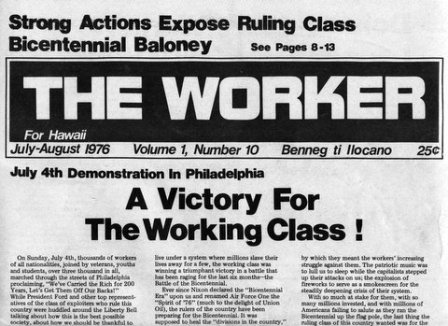
First Published: The Worker, for Hawaii, Vol. 1, No. 10, July-August 1976.
Transcription, Editing and Markup: Paul Saba
Copyright: This work is in the Public Domain under the Creative Commons Common Deed. You can freely copy, distribute and display this work; as well as make derivative and commercial works. Please credit the Encyclopedia of Anti-Revisionism On-Line as your source, include the url to this work, and note any of the transcribers, editors & proofreaders above.
“The whole of Poland is on strike today.” “We don’t need to discuss. We go back when the prices are put back.” These words were voiced by thousands and thousands of Polish workers who struck on June 25 to protest the government’s food price increases.
Just like their brothers in the Soviet Union, Polish workers had their socialist state ripped from their hands; sabotaged by a new exploiting class of capitalists who window-dressed themselves as communists. By the mid-1950’s Poland was on its way to becoming a full-blown capitalist country.
Like other capitalist countries, Poland has been rocked by a severe economic recession and inflation. This has compounded a big mess in agricultural production. State subsidies on food, a remnant of the socialist economy to keep food prices low, have totalled $5 billion a year. This money is now needed by the Polish state capitalists for investment.
Another root cause of the agricultural crisis is the Soviet Union’s plunder of Poland. The New Tsars of the USSR have intensified the economic burden the Polish workers must carry. Over the past few years the Soviet Union has backed out of agreements with Poland to provide needed grain, yet has continued to put the screws on Poland to supply it with large quantities of meat.
After a five year freeze on food prices (the freeze grew out of similar demonstrations by the Polish workers against a threatened price increase in 1970), Prime Minister Jaroszewicz announced that the freeze was to be lifted; sugar was to go up 100%, meat up 69%, butter and cheese up 30% and seafood up 30-60%.
The price increases were announced ahead of time to show that the Polish ruling circles were confident that the Polish workers would accept it. A hell of a lot did they know.
15,000 workers at the Zeran automobile plant went on strike, workers at the shipyards on the coast went out and workers at the Ursus Tractor Factory outside Warsaw also put down their tools. Workers tore up rail lines and hurled wood and metal barriers across the tracks 20 miles outside of Warsaw. In the city of Radom, demonstrators set fire to the headquarters of the ruling Polish Workers Party.
The demonstrations, resulting from the sharpening contradictions between the Polish working class and ruling class, are a serious challenge to the Polish capitalist government officials and fair warning by the Polish working class that any further attacks on the living standards of the class would meet the same kind of resistance. In fact, fearful of the workers struggle surging forward beyond even this stage of demonstrations, the government has postponed the food price increases.
There have been violent protests against the government before, sparked by rising prices after the restoration of capitalism. In 1970, workers struck the Baltic sea port cities and struggle spread elsewhere, with many strikes lasting a week. In one city workers burned down the misnamed “Workers Party” headquarters while singing the worldwide revolutionary workers’ anthem, “The Internationale.” The fierce struggle with the capitalists left 44 people dead. The head of government was forced to step down and the Polish state capitalists had to search for a new man to head things up. The food price increases were halted.
The Polish ruling class had not forgotten this history–the upsurge of the masses against them–but in their economic crisis they were forced to risk another political crisis, to try to force the workers to tighten their belts even tighter. But again the struggle of the Polish workers has meant another defeat for them and a significant victory for the workers.
In the US, the capitalists and their newspapers have tried to score some political points off the rebellion of the Polish workers with their old anti-communist soft shoe of, “Communism isn’t any better than it is here–in fact, it’s worse–in Poland workers must fight for food itself.” They would like us to believe that revolution is useless; the world remains the same, a few at the top and many on the bottom.
But the events in Poland prove exactly the opposite. It shows that Poland is as capitalist as this country and that, like in this country, workers will rise up against exploitation and oppression.